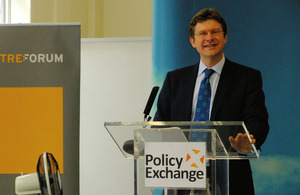Three actions needed to help the Big Society grow
In a major speech to the Policy Exchange, Greg Clark set out 3 key actions that will be fundamental to building the Big Society.

Greg Clark speaking to the Policy Exchange
Mr Clark said that the UK has become one of the most centralised countries in the democratic world “not just in respect of the balance of power between central and local government, but also in the disempowerment of the professions in the public sector; and in the way that voluntary organisations have been pushed out of the provision of public services.”
He said that decentralising power is what most unites the coalition and that for the “first time in decades the most powerful forces in British politics are aligned in favour of decentralisation.”
Already, ministers have begun to remove swathes of the obvious centralising and red tape policies have put “outrageous impositions on local freedom”, Mr Clark said, including ending regional strategies and putting housing back into local hands, making the health service more answerable to patients not politicians, allowing parents, teachers and charities to set up ‘Free schools’, abolishing Home Information Packs and a burdensome council inspection regime.
We need to turn central government upside down and inside-out. Instead of the civil service only being focused upwards on providing advice to Ministers - and inwards on its own priorities - we must drive the focus downwards and outwards to put those resources at the service of communities nationwide.
Fundamental actions
But the decentralisation of power and building the Big Society will depend on 3 further fundamental actions:
A right to know
Firstly a ‘right to know’, as part of a new era of transparency and public accountability.
Mr Clark said:
When public money is being spent, people should always be able to know how much is being spent and on what. This should apply to central government, local government and all public bodies that disburse public funds. Transparency is the foundation of accountability. It is also a powerful means of promoting efficiency, without requiring the heavy-handed intervention of an unaccountable bureaucracy.
A right to challenge
Secondly, ‘the Right of Challenge’ so consumers never again feel powerless to challenge the way public services are deployed.
Mr Clark said:
The consumers - and potential producers - of public services should have the right to change the way that public resources are deployed wherever and whenever a better proposal can be found. Judgements on these proposals should be made at the most local level possible - thereby enabling communities to truly take control of their own development. We should send a clear message to various public sector bureaucracies that their duty is to facilitate the decentralisation of power. Communities must stand before the bureaucracy as free agents demanding what is theirs, not as supplicants begging for scraps of freedom. That is why this government views self-determination as a right and not a privilege.
Turning government on its head
Thirdly, “turning government on its head” so it works for communities, not just ministers.
Mr Clark said “The state should exist to serve civil society, not the other way round.” The department is already establishing a “barrier-busting” team whose sole purpose will be to help community groups get the backing they need when they encounter bureaucratic obstacles to local objectives.
Mr Clark said:
If we want change to happen at the most local level, then we have to understand that at such a scale even the slightest bureaucratic hurdle looms large. Furthermore, it is very difficult for community institutions to get the help they need to get around these obstacles. That is why we need to turn central government upside down and inside-out. Instead of the civil service only being focused upwards on providing advice to ministers - and inwards on its own priorities - we must drive the focus downwards and outwards to put those resources at the service of communities nationwide.